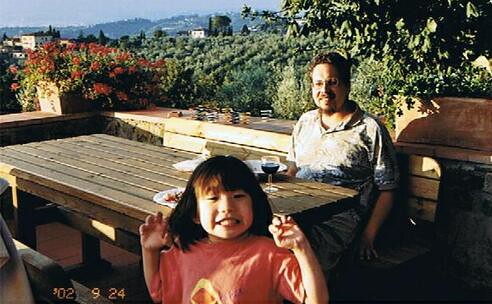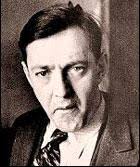|
|
Monday, September 15th, 2008
In the video that A White Bear linked yesterday, Mark Leyner is asked his thoughts about the audience he's writing for; he responds to the effect that he does not think about audience at all -- writing for him is an obsessive activity like chess for Bobby Fischer, with no object other than the text. David Foster Wallace takes exception to this:
Sometimes it's an act of communication. What makes the analogy ok but also makes it break down, is that
part of the Fischer-like obsession Mark's talking about consists in a kind of mental and emotional dance
with a constructed reader that you figure has a life more or less like yours, and whom in a weird way
you're talking to. Again, I'm like totally with you about 50% of it; the thing about it is that the
light and fun and all that stuff is definitely, that's part of what makes art magical for me; but there's
another part. There's the part -- and I'm afraid I'm going to sound like a puritan or a critic -- but there's
this part that makes you feel full. This part that is redemptive and instructive, where when you read something,
it's not just about -- you go "My God, that's me!" you know, "I've lived like that, I've felt like that, I'm
not alone in the world..."
I felt excited listening to Wallace saying this because it matches up with some things I have been thinking about since last year, specifically to describe my experience of reading Pamuk and more broadly as a way of talking about art in general -- I wrote a brief note about this last November. A White Bear says, Wallace is grasping to understand the possibilities of art as transformational, connective tissue between all these lonely people. For most 20th-c writers, that possibility is a sentimentality that died out around the time that Romanticism did. I want to find out more about this idea in a Romantic context. Were Romantic authors making this argument explicitly or is it something critics read into their work -- or is it an argument made by Romantic critics? And which ones? It's an argument I've been grasping around at for a while and it would be really useful to hear it from someone else's mouth.
 Update: and I guess obviously, duh, this is a strong sign that I should read Wallace's essays and criticism. Will get right on that.
posted morning of September 15th, 2008: Respond
➳ More posts about David Foster Wallace
|  |
Sunday, September 14th, 2008
David Foster Wallace hanged himself on Friday. I am sorry to hear that. Infinite Jest was sort of a late formative experience for me -- I mean I must have been 26 or 27 when I read it, and already pretty well acquainted with reading novels; but it seems like it opened some new windows for me into what writing can do. I have always meant to read more of his work but never gotten to it; now when I do, I will be reading the work of a dead man, work which is part of the history of literature.
 SEK has more at The Edge of the American West. In comments, politicalfootball links to this Charlie Rose interview. Ellen sends along a link to Wallace's commencement speech to the 2005 class at Kenyon. Worship power, you will end up feeling weak and afraid, and you will need ever more power over others to numb you to your own fear. Worship your intellect, being seen as smart, you will end up feeling stupid, a fraud, always on the verge of being found out. But the insidious thing about these forms of worship is not that they're evil or sinful, it's that they're unconscious. They are default settings. A White Bear is not yet ready to grieve. Mark Sussman has lost his favorite living author, and writes very convincingly about why he likes Wallace's work so much. Scott Esposito recommends we "Forget the obituaries and read the man's writing." At The Great Whatsit, Dorothy Gale writes about imagining what Wallace's last Friday might have been like. Andy Whitman feels like he's lost a friend. At This Recording, Meredith Gage considers Wallace in the context of marketing and advertising, and links to many more remembrances.
posted morning of September 14th, 2008: Respond
|  |
Friday, September 12th, 2008
 Samuel Beckett's Film (1965), featuring Buster Keaton as O, has been uploaded to YouTube by user richardhead. It is too long for a single video but I've created a playlist so you can watch the whole thing sequentially. Beckett called his production "an interesting failure"; Times critic Dilys Powell called it "a load of old bosh." Katherine Waugh and Fergus Daly wrote a celebration of Film's 30th anniversary for the Spring 1995 issue of Film West, "Ireland's film quarterly." Samuel Beckett's Film (1965), featuring Buster Keaton as O, has been uploaded to YouTube by user richardhead. It is too long for a single video but I've created a playlist so you can watch the whole thing sequentially. Beckett called his production "an interesting failure"; Times critic Dilys Powell called it "a load of old bosh." Katherine Waugh and Fergus Daly wrote a celebration of Film's 30th anniversary for the Spring 1995 issue of Film West, "Ireland's film quarterly."
posted morning of September 12th, 2008: Respond
➳ More posts about Pretty Pictures
|  |
Wednesday, September 10th, 2008
I've written up my summary of the story of Queipo de Llano's conquest of Seville -- you can read it over at History Time.
posted afternoon of September 10th, 2008: Respond
➳ More posts about The Passionate War
|  |
Tuesday, September 9th, 2008
Roberto Bolaño saw himself as a poet rather than a novelist: he said, “the poetry makes me blush less.” Now English speakers will have a chance to read some of his poetry; New Directions is publishing his first collection of poems, The Romantic Dogs, in translation this fall. (I can't tell whether the edition will be bilingual.*) At New Directions' site, you can read his poem The Worm, to get a taste -- I found it enchanting.
 (This poem sounds a lot like Ginsberg to my ears -- I hope that is honest reading and not just free-associating off the New Directions imprint. Lines like "built of brick and mortar, between United States and Mexico" and "Twilights that enveloped Lisa's father/ at the beginning of the fifties" bring "Howl" clearly to mind. Oh and "I saw him with my own eyes" is awesome.) *Aha! Amazon says it is bilingual.
posted afternoon of September 9th, 2008: 2 responses
➳ More posts about The Romantic Dogs
|  |
Monday, September 8th, 2008
Not as a medicine, but it is one of the richest springs from which the spirit can drink.  Perhaps it can't do great things for the body, but the soul needs literature like the mouth needs bread. Perhaps it can't do great things for the body, but the soul needs literature like the mouth needs bread. Literature is fortunately to hand -- Saramago has published a new book! The title is The Elephant's Journey; it is the story of the elephant Solomon, who in the 1500's travelled from Lisbon to Vienna. (This is what the article says; I'm presuming before that, he had also been transported from northern Africa to Lisbon.) It is not translated yet. And I have yet to read his most recently translated book, Death With Interruptions, about the problems of immortality. Saramago is also in the news calling for Spain and Portugal to unite in a single nation under the name Iberia. Not sure what to make of this.
posted evening of September 8th, 2008: Respond
➳ More posts about The Elephant's Journey
|  |
Sunday, September 7th, 2008
I am essentially a fiction writer, and if I ever cry, it's because I am worrying about the beauty of my book. Orhan Pamuk is interviewed today in the Deutsche Welle (in English). He speaks about his concerns for Turkey vis-à-vis Europe, and about his life post-Nobel Prize, and about the museum of innocence he has assembled to complement his novel Museum of Innocence. Which sounds totally worth making a pilgrimage to Istanbul for.
posted evening of September 7th, 2008: Respond
➳ More posts about Museum of Innocence
|  |
|
The first post has gone up at History Time -- Teozar, who is currently reading Peter Thompson's The Battle for Singapore, waxes incredulous at Percival's methods of defending against the Japanese onslaught. Nicely drawn! has gone up at History Time -- Teozar, who is currently reading Peter Thompson's The Battle for Singapore, waxes incredulous at Percival's methods of defending against the Japanese onslaught. Nicely drawn! The posts there are going to be approximately one per day, at least for the first little while -- a nice staid pace.
posted morning of September 7th, 2008: Respond
➳ More posts about History Time
|  |
Saturday, September 6th, 2008
OK, I spent a little time at the library -- fun! I felt like I was back in high school writing a research paper! (But in a good way.) (And no, I haven't really done much of that since high school -- this might be a mark against me -- oh well.) The two books I found were from 1970 and 1977, and confirmed with some variations the version of events in The Passionate War -- so my plan is solid to write about this version of events with a caveat up top, and to list Preston's book in the "Further reading" list. - The Revolution and Civil War in Spain, Pierre Broué and Emile Témine, 1970. tr. Tony White.
- The Spanish Civil War, Hugh Thomas, 1977.
I think I've got enough stuff for a nice juicy narrative post.
posted afternoon of September 6th, 2008: Respond
|  |
|
I'm starting to write a brief note about the capture of Seville in July 1936, which is one of the first incidents in The Passionate War that really captured my attention. The plan is to post the note on History Time this coming Wednesday. So far the main source documents I've found are The Passionate War and the Wikipædia entry on General Queipo de Llano, which unfortunately contradicts the book -- it says the narrative offered in the book "has achieved almost mythical status" but is refuted in recent research by Paul Preston -- presumably in his 1996 book, A Concise History of the Spanish Civil War. So, hm. I don't have access to that book right now, though it looks like a good one to check out. I think I will swing by the library this afternoon and take a look at a few more books. Probably my task for Wednesday will be to write up the mythical account -- which is after all what seized my imagination in the first place -- and to make note of Preston's writing and how I may have it all wrong.
posted afternoon of September 6th, 2008: Respond
| Previous posts about Readings
Archives  | |
|
Drop me a line! or, sign my Guestbook.
•
Check out Ellen's writing at Patch.com.
| |
















 where
where 